#mbti cognitive functions
Explore tagged Tumblr posts
Note
could u tell us more about each mbti type in general ? ur post about the whc characters was so interesting <3
i'm glad you enjoyed my post about whc, and of course, i'd be more than happy to brief you about mbti. however, i hope you don't regret asking this question, because you might have unleashed a beast.
so, get ready for a quick mbti class! here's a little cheat sheet i made for your reference:
so basically, mbti operates on cognitive functions, which are just the mental processes we rely on to make decisions and understand the world. there are eight functions total, and each one is either:
introverted or extraverted (how you engage with your inner self versus how you engage with the external world)
judging or perceiving (deciding versus observing)
everyone has all eight functions, but in different orders. your mbti “type” (like INFP, ESTJ, etc.) is based on which four you use the most, and especially your top two, called the dominant and auxiliary functions. these two shape most of your personality.
if your dominant function is a perceiving function (N, S), then your auxiliary function would be a judging function (T, F). if one is extraverted, the other is introverted.
so if you're an ISTJ, for example, that doesn't mean you don't perceive at all. the S in ISTJ helps you perceive (through sensing), while the T helps you judge. J in your mbti just means that your judging function (T) makes the external part of your personality (so, Te), while your perceiving function (S) is who you are on the inside, (so Si).
now that we have that out of the way, let me brief you on all 16 mbti types, based on their dominant/auxiliary function pairings:
INFP (Fi-Ne)
to explain functions a bit: an INFP's dominant function is Fi (introverted feeling), which means their personal values and emotions are very inward, deep, and individual.
their auxiliary is Ne (extraverted intuition), so they interpret the world through patterns, ideas, and possibilities, very externally focused.
so INFPs tend to be thoughtful, emotionally independent, and idealistic. they care a lot about authenticity and inner peace, and they love exploring new ideas and meanings behind things.
ENFP (Ne-Fi)
ENFPs lead with extraverted intuition, constantly scanning for possibilities, ideas, connections. their secondary function, Fi, means they check those ideas against their personal values.
they’re outwardly energetic, spontaneous, and full of big-picture thinking, but they’re also quietly principled and sensitive under the surface.
the difference between ENFP and INFP isn't that one is an extrovert and the other is an introvert (though that might be the case, a lot of times). it just means that ENFP's intuition (Ne) is stronger than their feeling (Fi), while an INFP's Fi is stronger than their Ne.
INFJ (Ni-Fe)
introverted intuition (Ni) leads INFJs to focus inwardly on abstract insights, long-term patterns, and “gut” feelings. Fe, their secondary, is how they connect to others, read emotional environments and try to maintain harmony.
they often come across as calm, gentle, and emotionally intelligent externally (because their external function is feeling), yet internally they can be intense and future-focused, thanks to their introverted intuition.
ENFJ (Fe-Ni)
ENFJs lead with Fe, meaning they prioritize external harmony and the emotional needs of others. their Ni makes them insightful about people’s long-term paths and potential.
they are warm, empathetic leaders, often guiding others with a mix of emotional intelligence and quiet vision.
again the difference between ENFJ and INFJ is that ENFJs rely on their external function (Fe) more, while INFJs rely on their internal function (Ni) more.
INTP (Ti-Ne)
Ti (introverted thinking) leads INTPs to analyze things logically and independently. paired with Ne, they explore endless possibilities, ideas, and patterns.
they’re deeply curious, skeptical, and abstract in their thinking. they can get stuck in their heads, but that’s also where they thrive.
ENTP (Ne-Ti)
ENTPs are idea machines. their Ne drives them to chase possibilities and mentally experiment with “what-ifs.” their Ti evaluates those ideas with internal logic.
they’re witty, rebellious thinkers, drawn to novelty, debate, and intellectual play.
INTJ (Ni-Te)
Ni gives INTJs a single-minded focus on long-term visions, strategies, and future outcomes. their Te (extraverted thinking) helps them organize the external world efficiently to achieve those visions.
they’re goal-oriented, rational, and strategic; rarely loud, but always calculating the next move.
ENTJ (Te-Ni)
ENTJs lead with Te, structuring the world around them based on objective logic and efficiency. their Ni keeps them oriented toward long-term goals and intuitive predictions.
they’re decisive, commanding, and visionary; often seen as natural leaders who value competence above all.
ISFP (Fi-Se)
Fi makes ISFPs deeply value-driven and emotionally independent. Se means they perceive the world through immediate sensory experiences.
they’re artistic, grounded in the present, and often express emotion through action or creativity rather than words.
ESFP (Se-Fi)
ESFPs are vivacious and in-the-moment. their Se makes them attuned to the physical world, while Fi means they still stay true to their personal values.
they’re bold, warm, and emotionally reactive; often spontaneous with a hidden depth.
ISTP (Ti-Se)
ISTPs use Ti to assess things logically and independently, and Se to interact fluidly with their environment.
they’re adaptable, often quiet but sharp, with a love for mechanics, hands-on problem-solving, and autonomy.
ESTP (Se-Ti)
ESTPs lead with Se, reacting instantly and confidently to their surroundings. their Ti filters those perceptions with logical precision.
they’re bold, action-oriented, and love pushing boundaries, often charming and clever, with an appetite for risk.
ISFJ (Si-Fe)
Si (introverted sensing) makes ISFJs rely on past experiences and traditions, while Fe helps them care for others and maintain harmony.
they’re gentle, loyal, and highly observant of people’s needs; usually quiet, but emotionally strong and dependable.
ESFJ (Fe-Si)
ESFJs lead with Fe, actively maintaining social harmony and supporting others. Si makes them grounded in familiarity and routine.
they’re sociable, nurturing, and detail-oriented, often the “glue” that holds groups and communities together.
ISTJ (Si-Te)
Si leads ISTJs to be meticulous, detail-focused, and grounded in what they know works. Te organizes the world around them in a practical, no-nonsense way.
they’re responsible, reliable, and value order and duty above chaos or novelty.
ESTJ (Te-Si)
ESTJs are dominant Te users, they love structure, control, and results. paired with Si, they draw on past systems and rules to create stability.
they’re firm leaders, often blunt but dependable, and motivated by getting things done right.
•
so that's mbti types explained through cognitive functions in the simplest way possible. hope it helps!

#ask owl#suhosieun#mbti#mbti types#cognitive functions#mbti cognitive functions#mbti personality types#mbti personalities#infp#enfp#infj#enfj#intp#entp#isfj#esfj#istp#estp#istj#estj#intj#entj#isfp#esfp
41 notes
·
View notes
Text
INTJ: Logical Fairness and Equal Exchange
**I can’t pinpoint the functions one by one, else this will be too lengthy, but I’ve covered mostly the primary to tertiary functions, not much on Se.** We have… Introverted Intuition (Ni-Primary), Extraverted Thinking (Te-2ndary), Introverted Feeling (Fi-Tertiary), and Extraverted Sensing (Se-Inferior)
INTJs Perception on Fairness:
We rely on logic and intuition (or a certain inner knowing). There is this thing of fairness… and fairness to us is more logical than emotional. We can see things fairly, without it affecting our feelings, we can make choices without being attached, and we won’t see it in any way as hurtful or rude. We act fairly because we believe it to be “right”, not because a certain choice uplifts us, not because we want to appear helpful, not because of pity, and not because we want others to feel indebted to us. That’s why we find accountability and integrity--- a natural and innate concept. (if we are objectively wrong, then we're simply wrong).
And, as each person is unique(regardless of MBTI), INTJs will side on either Fairness or Manipulation (in negative). INTJs who believe in equal exchange or fairness are healthy INTJs. INTJs who explicitly manipulate have a part of them that’s underdeveloped or unhealthy, especially their feeling function.
The term of fairness and equal exchange, when applied to skills for an INTJ:
The fact is that an INTJ is JUST simply an efficient and straightforward human being; we are just good at our job and knowing things… living and getting things we want, the way we want it. We know we are capable of pushing limits, but we are not overly delusional. We have our limitations, and from time to time, we challenge those limitations, because we don’t want anything holding us back, especially our own LACK and DEFICIENCIES. We don’t want OURSELVES holding us back.
Therefore, we need SKILLS to move past these limitations. Which means valuable input and training. What better way to learn than through human interaction, human insight, and being surrounded by the right people with those skills that we want.
Reverting back to “valuable”, we believe that it is healthy for humans to be INTERdependent. Because an interdependent community is where humans thrive in support and aid, which benefits all sides. EQUAL AND FAIR GIVING AND RECEIVING. If we can get information etc., from someone, then we also believe that we can offer something valuable to that someone.
Usually, skills and training are something you pay for, and when you have access to those skills via close-knit relationships, it’s much more likely for them to reject payment. INTJs can’t have that — “like, how dare we… leach off from you?! Blatant shame on us INTJs!”–we can’t face the fact that you’ll have nothing to benefit from us.
Additionally, we believe knowledge is currency; knowledge is so valuable that it is monetized. IN THIS ECONOMY?! *deep breaths* You have to at least… want to learn a thing or two from us as well.
Humans are ever evolving, skills and knowledge open you up to opportunities, in our minds… “why not take this chance of exchange, to improve each other’s skills, so that we both gain something from it, and I won’t feel like I’ve free-loaded your personal time.”
And before anyone says, “Well, ummm actually… I’ve met snobbish and selfish INTJs”... An unhealthy INTJ, on the other hand… Yes, they will think they’re far superior and untouchable… Because they haven’t developed their Fi function. They have weak philosophies in life and personal values.
INTJs are one of the most willing people to help with anything analytical, theoretical, and intellectual etc. Of course, those don’t come for free, and you should also put something on the table that you believe can prove useful to INTJ someday. (Just don’t ask them about anything feelings-related, unless you prefer brutal truths and logical discourse regarding it. Because they are fond of internalizing and rationalizing their strong inner feelings to make sense of them.)
#intj#intj female#intj thoughts#mbti intj#intj personality#mbti types#mbti#intj mbti#intj woman#intj women#intj male#intj man#mbti personality types#personality types#16 personalities#intj aesthetic#intj fairness#myers briggs#mbti personalities#enneagram#intp#infj#entp#entj#infp#enfp#psychology#mbti cognitive functions#function stacks#mbti function stacks
9 notes
·
View notes
Text
mbti tertiary functions (boredom functions)
INFJ/ISFJ: true crime, scrolling through wikipedia for hours, looking up riddles, scrolling through "onlyjayyus" tiktok, has a huge duolingo streak
ENFJ/ENTJ: uses se to support te/fe ambitions (sports, performing arts, community service, cleaning)
ESFJ/ESTJ: fantasizing, vision boards on pinterest, adding items to amazon wishlist, makes a bucket list for the year,
ESTP/ENTP: touches grass, hangs our with friends, class clown, watches reality tv, starts drama for no reason, debates on the internet (or fights irl if you're an estp 👀)
ESFP/ENFP: random urge to organize computer, random internet debates, creates new playlists, watches video essays about random topics, argues with friends about either stupid or smart things
INFP/INTP: reminisces about things. procrastinates. overthinking past conversations in the shower. collects cool rocks. photography. listens to the same song over and over again.
ISFP/ISTP: planning and...stuff. zodiac, psuedoscience, etc. strategic/world building video games, has a whole fictional world planned out in their head.
INTJ/ISTJ: "write in their feelings diary" 💀 IM SORRY, introspection, often known as super "self aware" as a result, watches nostalgic or comfort movies
#mbti#mbti memes#mbti personalities#mbti types#mbti personality types#infp#infj#intp#entp#intj#entj#enfp#enfj#istp#cognitive functions#16 personalities#esfj#estj#isfp#esfp
2K notes
·
View notes
Text
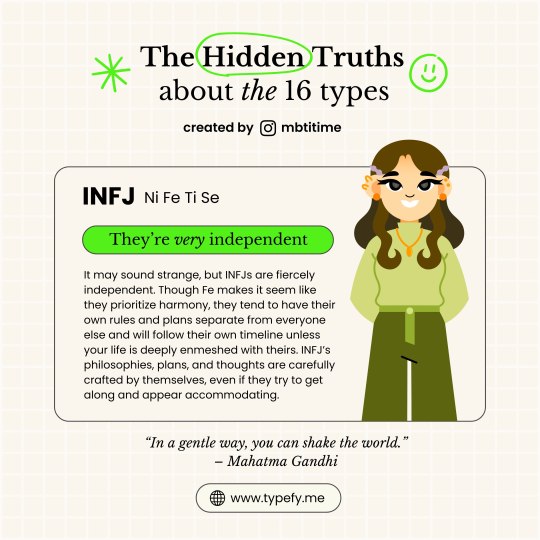
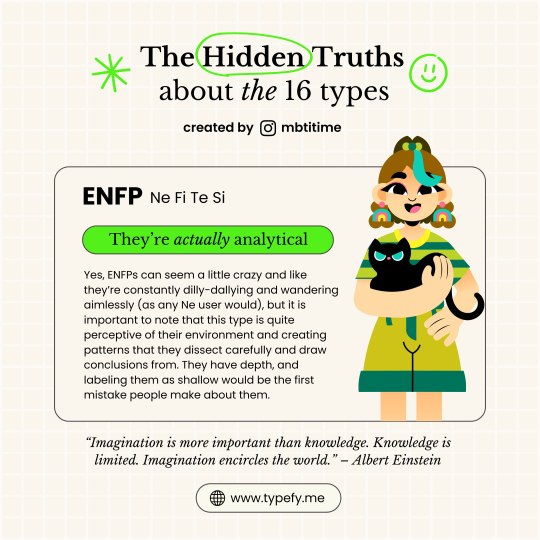
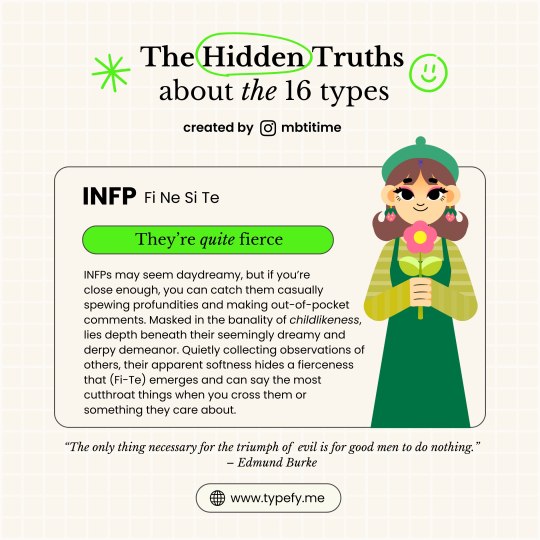
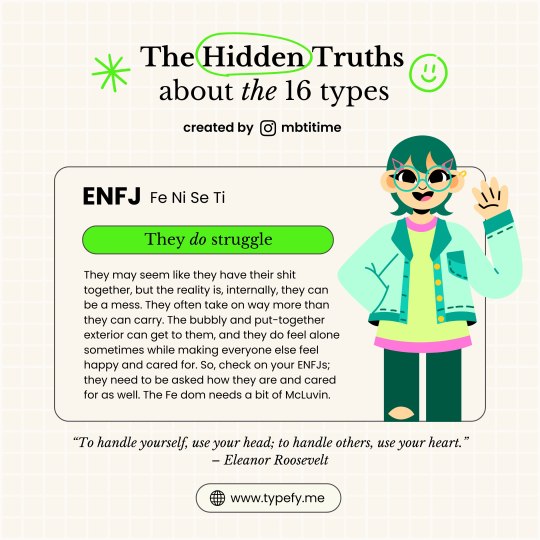
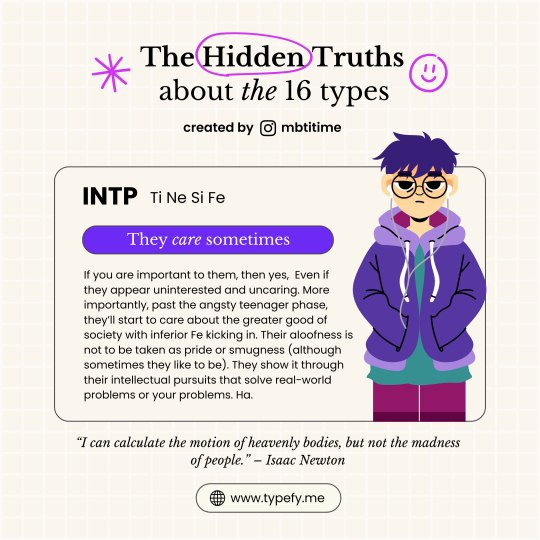
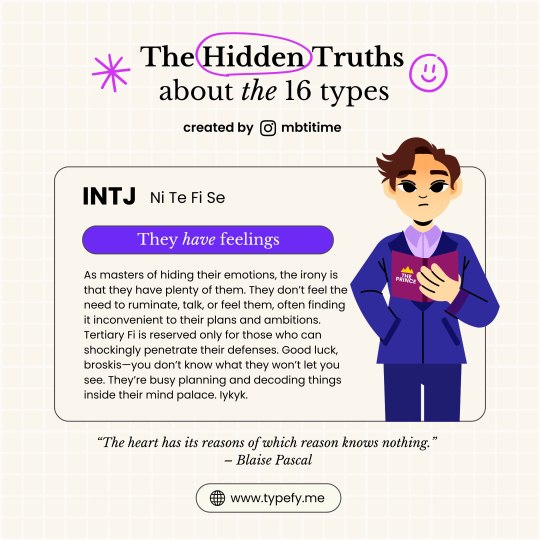
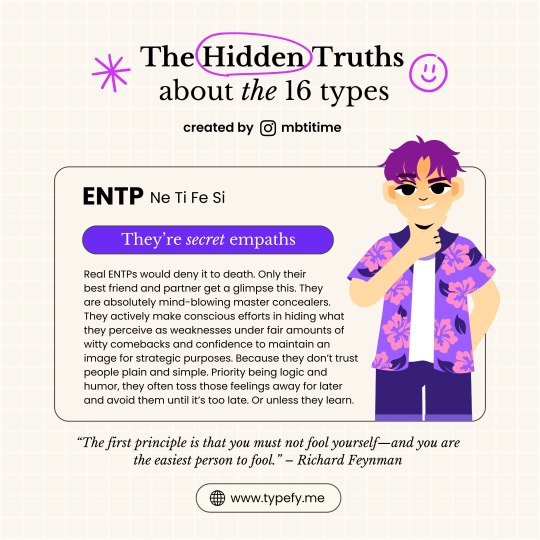
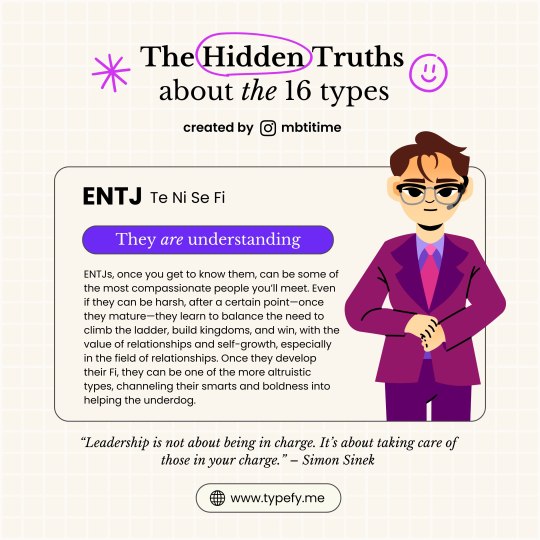
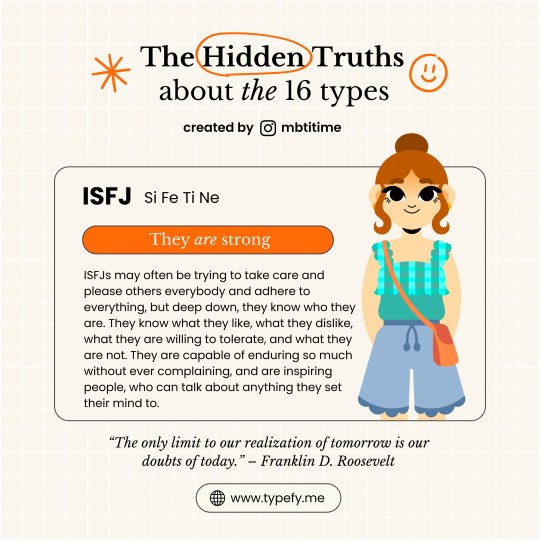
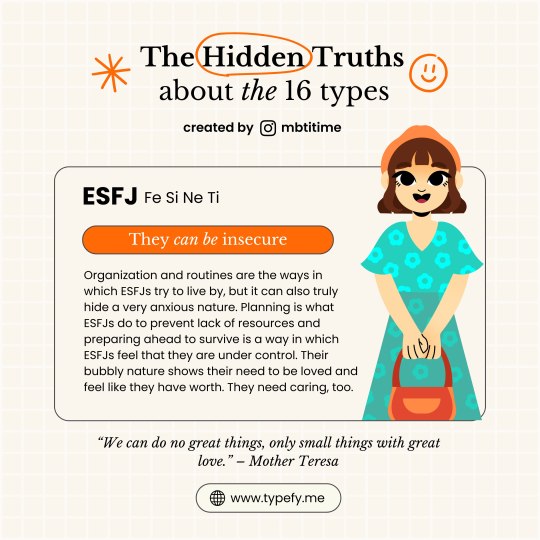
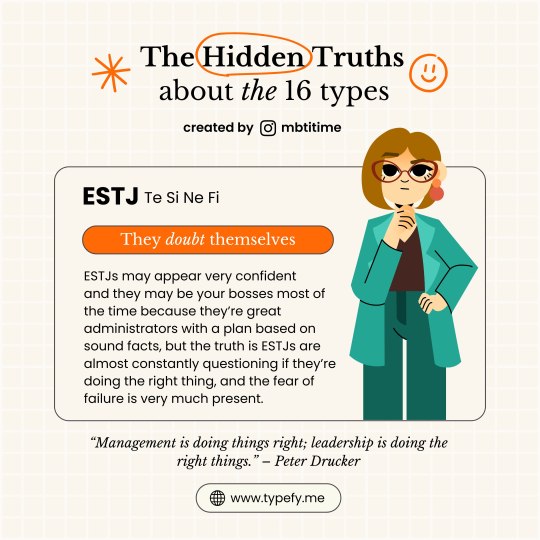
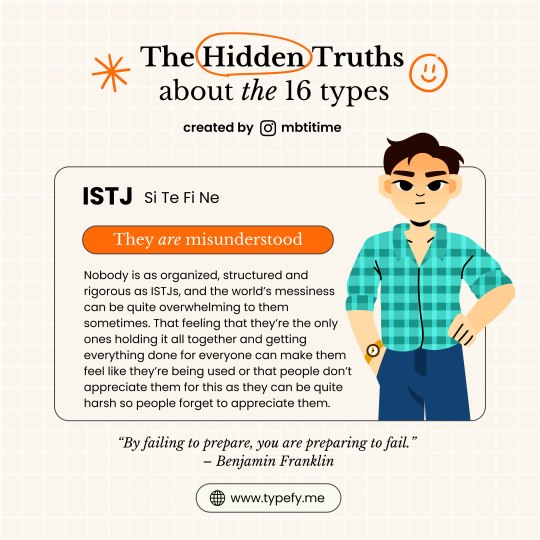
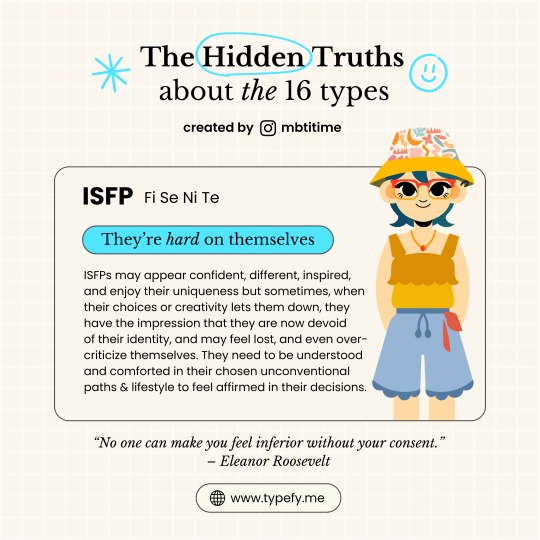
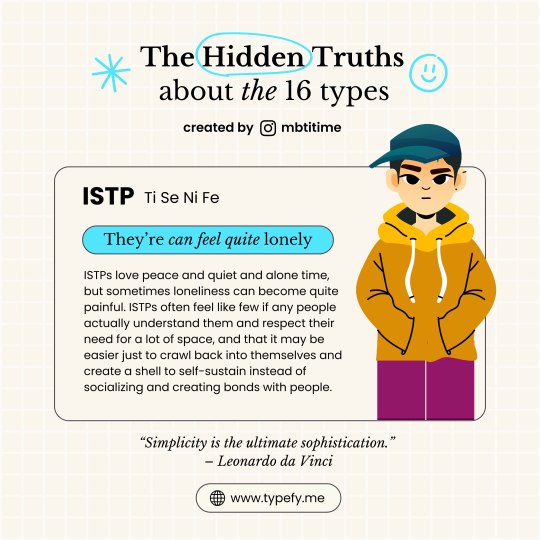
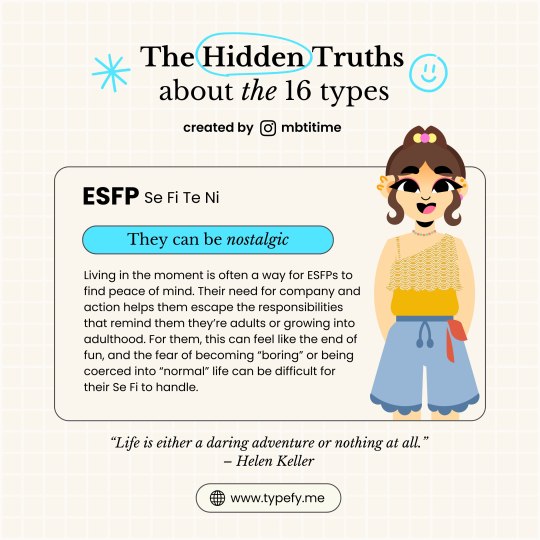
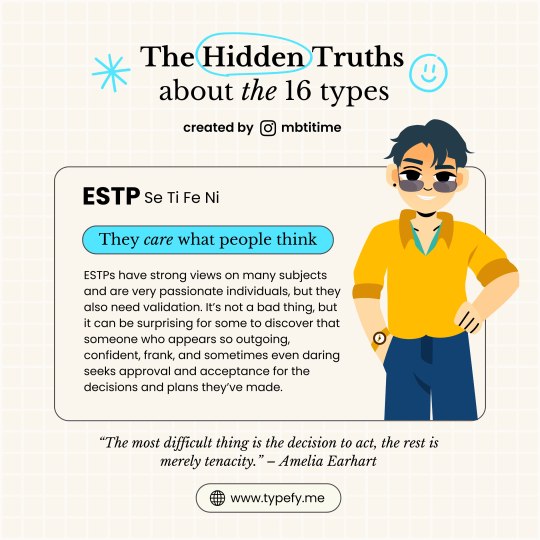
My Not-so-secret Secrets of the 16 types
Follow me on Instagram, Facebook, Twitter, YouTube and everything else @mbtitime and @typefy
#mbti#16 peresonalities#16 personalities#16 personalidades#infp#infj#enfp#enfj#intp#intj#entp#entj#isfp#istp#isfj#istj#estj#estp#esfp#esfj#carl jung#cognitive functions#myers briggs
596 notes
·
View notes
Text
MBTI Color Palettes
Just color palettes I associate with each type. Just for fun.
INTJ

ENTJ

INTP

ENTP

INFJ

ENFJ

INFP

ENFP

ISTJ

ESTJ

ISFJ

ESFJ

ISTP

ESTP

ISFP

ESFP

___
MBTI notes
#mbti#colors#color palette#typology#cognitive functions#myers briggs type indicator#myers briggs#intj#entj#intp#entp#infj#enfj#infp#enfp#istj#estj#isfj#esfj#istp#estp#isfp#esfp
867 notes
·
View notes
Text

As an ENTP, internally screaming "AHHHHH" 24/7 is an accurate depiction of my life.
171 notes
·
View notes
Text

Brain Cog Volume. 1
Here's the rest of the comic ^_^ So sorry for the long wait I got a lot of things going on IRL and forgot to post the rest of this :')
Enjoy the comic! I know it's something simple and sweet but this is a project for my Comic class. PART 1 / PART 2









#mbti#main functions#Brain Cog#User#Comic#cognitive functions#intj#art#myers briggs#te#mbti art#ni#fi#se#original character#oc
81 notes
·
View notes
Text
xNTxs with a hot take:

#even when they're wrong#or maybe when we're wrong#entp#intp#intj#entj#rationals#personality#personality type#mbti#cognitive functions#ne#ti#te#ni#meyers briggs
765 notes
·
View notes
Text
People who self-type as rare and "desired" categories, such as INFJs, INTJs, 5s, 4s, IEIs, ILIs and all Ns by extension
Let me ask, to what extent would your self-worth differ if you concluded you were mistyped and to what extent would it change if you found typology to be a false idea?
Back when I believed socionics was the answer to everything at 15, I was negatively affected by that interest. I questioned many things about myself because I seemed to have traits that didn't fit my EII (INFP,INFj) type, but I settled on it eitherway because of my focus on morality. It didn't help how little self esteem I had to be of the least impressive of the 4 "intelligent" types (and in the circles I was in most types were dismissed as "normie idiots") Socionics changed how I saw others. I believed others lacked moral values and intelligence, thought in a manner inconceivable to me and would fundamentally be bad company for me (and I for them)
Enneagram too had me constantly questioning every aspect of my behavior in order to confirm that I was indeed a "5w4"
If you are invested in personality typing, I think you should consider the influence of your emotions on your investment and take a short break. It helped me realise these systems fail to predict human behavior and the categories are largely arbitrary: people believe because it allows them to be superior to the majority and because it's a safety harness. If you are no longer certain about these systems, it might be useful to share your opinion of them in retrospect
constant edits: I've been learning to write this year and I am disappointed at my early writing
#socionics#mbti#functions#cognitive function#enneagram#five#four#iei#ili#infj#intj#typology#personality types#personality test#5w4#5w6#4w5#4w3#intuitive
98 notes
·
View notes
Text
The Mind Palace
Episode one: Introductions






tags: @oiblackestsheep @wyvchard @cognitivedoodles @genderfluid-goblin @justcallmedom31
In hindsight this is rather long for a first comic, but I'm really proud of how it came out! Even if it came a week late 💀 Thanks for reading and make sure to stick around next month (? hopefully) to meet Fi and Te!
#comic art#comics#mbti#mbti fanart#the mind palace#Ne#Si#cognitive functions#this nearly killed me#will I learn my lesson for next time?#probably not#but I had so much fun so it was worth it#hope you enjoyed!
23 notes
·
View notes
Text
MBTI Perceiving Cognitive Functions Explained Fast & Dirty
Note: Sister post to judging functions explanations for @loupdelta
Perceiving Functions
Purpose: How you take in information from the world that informs the decisions you make via the judging functions.
Extraverted Sensing (Se): Taking in information that is happening in real-time around you using your 5 physical senses. It sounds simple and that's because it kind of is! These people live in the here and now, and they tend to use Se to make very practical and relevant decisions that directly impact the situation in front of them. They don't typically get caught up in impractible abstract ideas or outlandish notions and they deal only with observations that everybody can share.
Introverted Sensing (Si): Relying on information built up over time from the individual's personal experience/past. These people are also practical and don't tend to get caught up in irrelevant theories that can't be applied to the situation at hand. Think "the devil is in the details" for these people. They focus on even minute details so that they can make the most informed and pragmatic decisions as possible.
Extraverted Intuition (Ne): Relying on the exploration of all possible effects or outcomes of a particular situation that anyone could imagine. These people are big picture focused and don't get bogged down by details that have little impact. These people like to consider every potential future before making a decision so that they have the most complete description of what the situation currently is and what it will be like next after this person takes action.
Introverted Intuition (Ni): Taking in all aspects of a situation that the individual personally decides is important for decision-making, usually summarizing all of the information in a way that puts it into short and simple terms. These people are also big picture focused and enjoy using their short summaries to focus on what the most-likely future outcome will be. Highly theoretical, these people can prefer to use metaphors to describe the current situation and explain how the ending will come about.
For your reference, below are all 16 types with the order in which their cognitive functions are placed (essentially, in order of strength). I've organized them by their strongest perceiving functions.
Note: All types have both sensing and perceiving functions because everyone has the ability to focus on practical details and think about abstract big pictures.
High Se users (xSxP)
ESTP: Se-Ti-Fe-Ni ESFP: Se-Fi-Te-Ni ISTP: Ti-Se-Ni-Fe ISFP: Fi-Se-Ni-Te
High Si users (xSxJ)
ISTJ: Si-Te-Fi-Ne ISFJ: Si-Fe-Ti-Ne ESTJ: Te-Si-Ne-Fi ESFJ: Fe-Si-Ne-Ti
High Ne users (xNxP)
ENTP: Ne-Ti-Fe-Si ENFP: Ne-Fi-Te-Si INTP: Ti-Ne-Si-Fe INFP: Fi-Ne-Si-Te
High Ni users (xNxJ)
INTJ: Ni-Te-Fi-Se INFJ: Ni-Fe-Ti-Se ENTJ: Te-Ni-Se-Fi ENFJ: Fe-Ni-Se-Ti
79 notes
·
View notes
Text
what Ni is NOT
a lot of people in the community get Ni wrong. and i totally get that because Ni is often talked about in a super vague, weirdly prophetic light. which it is NOT.
Ni does NOT mean you can’t make connections between ideas
Ni does NOT mean you only see one truth
Ni is NOT a predictive function
all Ni is, is intuition as it makes sense to you personally. Ne, looks at the outside data and expands on that, Ni looks at the outside data and puts it in their internal framework. that’s the only difference. that Ni is personal and Ne is less personal when dealing with the abstract.
the combination of Se and Ni can come across as Ne because the user takes the tangible details and then subconsciously adds them to their mental framework. the way i personally decide between Ne and Ni is often based on this, idea. that Ni tends to be a more subconscious process, often with the user struggling to explain where the conclusion came from. Ne tends to be an obvious process. i have never once had to question where an Ne user got their idea from, because they often talk through their process unknowingly.
but just because you can’t fully understand it does NOT make Ni a sort of prophetic function. never was and never will be. it’s just the process of boiling physical things into concepts and adding said concepts to a mental framework that only makes sense to that specific person.
#mbti#mbti types#infj#introverted intuition#intj#mbti infj#personality theory#cognitive functions#typology#carl jung#myers briggs
303 notes
·
View notes
Text
I hate hate hate when I see ppl getting my interests WRONG
#I'm talking abt typology ppl are like “assigning mbti types to these characters!! ahem!! there's I for introverted and E for extroverted-”#cognitive functions plssss#and ond typed Yuga as ISTP... where's Ti? explain bc I don't see it at all (or maybe I didn't focus on the anime)#I understand ISFP and ESFJ bc a lot ppl explained why they type him as such in the pdb comments#but on twitter. someone said “I think Yuga would be istp.#“isfp can work too..#“ and there's no explanation#the tweet talking abt mha characters' mbti explained what mbti is by LETTERS (yk those pop psychology 16personalities dot com type of stuff#and they blindly typed the characters based on the most pdb votes#no reasoning at all#just assigning the four letters to each character bc most votes said so#but what if many comments on pdb didn't approve of the typing or the typing is old?? hm?#and ofc my stupid impulsive ass had to correct...#anyways I'm sure many ppl relate to having your interests misinterpreted and treated inaccurately#rant#if these ppl go and tell me “it's just for fun! it's not that deep!!” as a response I'm gonna crash out#then go with those “what type of burger are they” shit and leave typology alone (idk if astrology lovers feel the same too with pop culture)
15 notes
·
View notes
Note
to add to my most recent post about functions, how would you describe se and si because i get so tired of seeing “sports and adrenaline!!” “memory and nostalgia!!” for them in descriptions 😭🙏 and how would si-ne and fi-te interact as the aux and tert functions? i love your responses as always 🫶🫶
YESS I literally hate sensor/intuitive descriptions with burning passion...especially that one ni description I read online 😭...
I genuinely relate and understand more of functions through examples of them irl, so I sorted them this way if that is more helpful
se
very opportunistic: might see a sale at a store and jump on the offer (even do the math if high in ti). will also be quick to join in on tiktok, fashion, or internet trends and get easily excited and interested in them.
sees loopholes in rules/guidelines, finds ways around it
better at improvising situations: when cooking a recipe they will know what to do when missing an ingredient. will eyeball measurements they have to take. more likely to think of fun quick last minute plans if something goes wrong.
absurdism/stoicism: controlling what you can, embracing whatever happens, push and pull between finding meaning and being indifferent, makes meaning personal
mayyy be appearance focused (not always); jewelry, hair, makeup, FASHION...
si
can see distinctions easily: what someone sees as a forest, the si will see as spruces, pines, maples, etc. might also say, "__ is NOT the same as ___." is aware of grammar more quickly than others (not because they're focused on it, they do it with ease).
focused on mistakes: (might be forgiving if high in fe, but more like "forgive but don't forget.). BUT also remembers mistakes made by self as in hopes to not repeat them in the future. could also make them perfectionistic.
"oh, this reminds me of ___!!": gets excited when they learn a new word, and later see it used in a tiktok ;p
skeptical of things: doesn't trust ads they see immediately, does research on a product before buying, thinks critically about social media (and celebrity culture in general), doesn't trust if something is 'too good to be true'
focused on meaning: unlike se which is more indifferent, the istj is more likely to ask what the point of doing something before they do it. doesn't necessarily like things that are pointless (combined with unenjoyable). **DOESN't mean they don't have hobbies based on enjoyment, tbh most istj's find meaning through their own emotions as well
71 notes
·
View notes
Text
















The 16 types as Inside Out Emotions
Follow me on Instagram, Facebook, Twitter, YouTube and everything else @mbtitime and @typefy
#mbti#myers briggs#16 personalidades#16 personalities#16 personality types#infp#infj#intp#intj#enfp#enfj#entj#entp#isfp#isfj#istj#istp#esfp#esfj#estj#carl jung#cognitive functions
99 notes
·
View notes
Text
𝔼𝕏ℙ𝕃𝔸𝕀ℕ𝕀ℕ𝔾 ℍ𝕆𝕎 𝕋𝔼 + ℕ𝕀 𝕎𝕆ℝ𝕂𝕊 𝔸ℕ𝔻 𝔻𝔼𝔹𝕌ℕ𝕂𝕀ℕ𝔾 𝕄𝕀𝕊ℂ𝕆ℕℂ𝔼ℙ𝕋𝕀𝕆ℕ𝕊 (𝕔𝕠𝕞𝕚𝕟𝕘 𝕗𝕣𝕠𝕞 𝕒𝕟 𝔼ℕ𝕋𝕁)

xNTJs are often stereotyped as evil CEO billionaire masterminds, so these types are often bombarded with horrible misconceptions. First, I’ll explain how the two functions work together, then I will debunk misconceptions. I will also compare INTJ and ENTJ
*ೃ༄Extroverted Thinking*ೃ༄
Te: Extroverted thinking is the most pragmatic function of all the cognitive functions. It is only concerned with what is impersonal, objective, and truthful. It is focused on the systems, laws, and structure in the environment. It makes decisions based on how logical something is based on if it’s truthful compared to external logic. While Ti users aim to understand their logical interpretation of something, Te users are only concerned with what is universally true. Te is like deductive reasoning. It draws a conclusion based on external rules you know to be true.
How it manifests: Te users are concerned with results because of their natural instinct to prioritize the logical connections and effects of decisions. If Ne is focused on connections between abstract ideas, Te is focused on how logical ideas connect to each other. They have less focus on internal consistency/reasoning within one idea. Te users are often blunt, strategic, organized (mentally), and good at managing.
*ೃ༄Introverted Intuition*ೃ༄
Ni: Introverted intuition is focused on abstractionism, symbolism, main ideas, and trends. Rather than seeking possibilities, newness, and change, Ni is convergent, seeking one core insight or pattern than endless options. Ni users are visionaries: they are focused on one possibility and building upon it. While Ne spreads ideas outwards, Ni takes information in, distilling many inputs into a singular, synthesized insight.
How it manifests: Ni users are not very spontaneous. They are focused on predicting how the future could play out. They ask themselves: “Where is this going?” “What’s the purpose of this?” etc. They often step back from the noise of the present to analyze what is happening. Ni users often get “aha” moments where they realize the overall theme and connection of an idea, but oftentimes they glimpse over smaller details. Sometimes, they “just know” without linear reasoning and step-by-step logical build-up. Ni users can often be poetic and enjoy symbolism and metaphors in media and literature.
*ೃ༄How Te + Ni work together*ೃ༄
I call the Te + Ni combination “the visionary” or "the truth finder" because not only are these types constantly building upon an idea, but they are also consistently focused on the overall structure and main idea of everything. xNTJs are concerned with putting everything into boxes based on the overall framework and ensuring it all connects logically. The Te + Ni combo is a truth seeker, always focused on finding the meaning behind everything. Te takes Ni’s insight and translates it into concrete plans, systems, and structures that can be applied in the external world. The two functions create a mindset that is always refining and building upon ideas for long-term impact and efficiency.
*ೃ༄Misconceptions*ೃ༄
I blame 16personalities, my nemesis, for most of the misconceptions
Te is controlling and bossy -> FALSE. That is a BEHAVIORAL trait. Te = / = bossy, it is simply a cognitive function that focuses on external logic. Controlling the environment is not Te, that is more related to socionics Se.
Te lacks empathy -> low Fi does not mean someone lacks morals or emotions. None of the cognitive functions stand for feeling emotions. Fi is simply a function that evaluates and interprets internal feelings and is focused on subjective interpretations/meaning. A Te user usually pushes their feelings aside to seek the impersonal truth, but that does not mean they are heartless.
ENTJs are explosive and impatient -> unless you’re dealing with an unhealthy ENTJs, typically, Te doms tend to put emotional needs aside to act impartial. But it is true than ENTJs may be unaware of how their emotions build up and may become explosive under stress.
Emotional manipulative character, are they Te or Fe dominant? -> if someone emotionally manipulates but chooses not to dive into other people’s feelings usually, then they are probably a Te user. Te users would rather focus on logical manipulation as they lack concern for the emotional atmosphere, but speaking from a socionics perspective, dominant Te users may be capable of adapting to the emotional atmosphere, but this effort is lowkey and of short duration. If someone is focused on constantly adjusting to other people’s moods and emotions, then they are an Fe user. An evil and controlling character is not always a Te user.
Controlling, action-oriented character, ESTP or ENTJ?: Generally speaking, many stern, bossy, power-hungry ESTPs are mistyped as ENTJs (cough cough Sukuna), but it is never the other way around. Remember, ENTJs still have auxiliary Ni, so they would rather step away from the environment and evaluate before jumping into action (unless they are in Te-Se loop). ENTJs are judgers, meaning they need to analyze where the situation is heading before acting. ESTPs focus on living in the moment. If this archetype does not value abstractionism, structure, logical connections, or hidden meanings, then chances are they are not a true ENTJ.
Ni is about having hunches and being able to predict the future -> that’s a superpower, silly. I mean I wish I had that ability, but no, Ni is not about literally predicting the future. Ni will try to predict how situations will enroll.
Ni is detail-oriented and good at planning things out -> while aux Te can help INTJs be exceptional at planning, Ni is not step-by-step itself. It usually jumps to conclusions due to the prioritization of main ideas and overall structure. Intuition functions are not rational, and they focus on ideas that are not pragmatic or concrete.
Quiet, mysterious, stoic character, INTJ or ISTP?: a lot of ISTPs get mistyped as INTJs (Wednesday Addams). ISTPs analyze and see themselves as being in the moment, while also focusing on their logical perception of the whole situation. INTJs see themselves as being apart from what is going on around them and analyze the situation from afar, looking for main ideas and structure.
INTJs are cold and emotionless -> this, again, is a behavioral trait. There’s probably no need for an explanation
xNTJs can’t be impulsive -> this statement is half true. xNTJs would rather not jump into action without thinking, but they tend to focus on main ideas over details, which means they may be careless when evaluating situations.
xNTJs are unaccommodating -> not always, being a nice person has nothing to do with cognitive functions. I’m an ENTJ who scored SCOAI in big five soo.
*ೃ༄Differences between ENTJ and INTJ*ೃ༄
ENTJs value taking action efficiently and quickly, INTJs value fully analyzing the situation before acting
ENTJs are more impersonal and logic-oriented, while INTJs tend to me a bit more attuned to their feelings and focus more on symbolism and abstractionism (Tertiary Fi)
ENTJs are better at living in the moment than INTJs
ENTJs push against the idea of making decisions based on their personal needs, emotions, or subjective interpretation (Te against Fi), while INTJs push against the idea of making decisions in the moment or simply evaluating the situation as it is (Ni against Se. Ni favors hidden meanings and intuition, while Se values realism).
ENTJs are more pragmatic than INTJs, who favor intuition and abstractionism more than ENTJs (Dominant Te and ter. Se)
ENTJs focus on the environment around them more, while INTJs tend to live in their head
INTJs are better at evaluating their own emotions and personal views on situations, while Fi being inferior puts ENTJs in a more vulnerable position when it comes to dealing with such matters. Hence, ENTJs either don’t care about evaluating their own feelings, or they feel insecure when it comes to controlling their emotions (Te suppresses Fi)
Similarly, ENTJs are better at acting in the moment when needed, while INTJs are not as quick to adjust to external systems/environments. Se being inferior puts INTJs in a more vulnerable position when it comes to dealing with fast-moving situations. INTJs either don’t care about living in the present/being present in the moment, or they feel insecure when it comes to not being able to take decisive action when needed (Ni suppresses Se)
ENTJs may aspire to be more connected with their emotions, while INTJs may aspire to be more focused on the present
ENTJs become more focused on themselves, emotionally explosive, biased (in terms of their subjective views), etc. when they are stressed, while INTJs feel the need to act/focus in the moment
Most common ENTJ enneagram = Social/sexual 1, social/self preservation 1 (e8 is rarer for ENTJ. Wings include 1w2, 3w4
Most common INTJ enneagram = all enneagram 5 subtypes, self preservation 1. Wings include 5w6, 5w4, and 1w9
Anyways hope this helps :)
#mbti#entj#intj#mbti intj#mbti entj#intj personality#entj personality#myers briggs#myers briggs type indicator#cognitive functions#carl jung#socionics#16 personalities#typology#enneagram#enneagram 3#enneagram 1#enneagram 5#1w9#1w2#3w4#5w6#5w4
16 notes
·
View notes